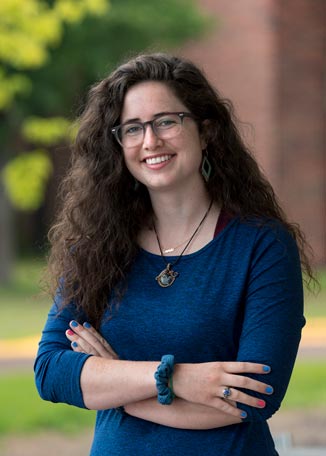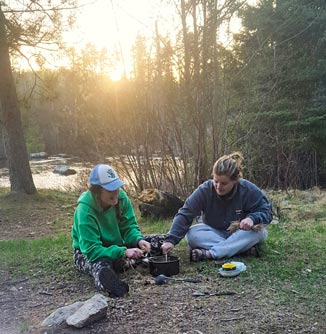Annie Johnson '18: Putting the ‘wild’ back into ‘life’ and getting people outside with Wild Minds
July 24, 2018
By Mike Killeen

Annie Johnson '18
Photo: Tommy O'Laughlin '13

Annie Johnson (left) and Hannah Windschitl during the Boundary Waters canoe trip.
Annie Johnson decided to take her environmental studies senior thesis to heart.
During the 2017 fall semester, Johnson researched how the techniques of formal wilderness therapy settings can be applied to college students and campuses.
“I did not want my thesis to simply sit and get dusty. I needed to do something with my research,” said Johnson, a 2018 graduate of the College of Saint Benedict.
The result of that thesis led to the formation of Wild Minds, a program designed to help students experiencing depression, stress and anxiety.
The Wild Minds program combined outdoor adventures, mental health awareness and a positive social atmosphere as a way to introduce a small group of students to the natural resources available at CSB and Saint John’s University.
The students in the program met on seven Sunday sessions from February to May to snowshoe, rock climb, hike, create wilderness art, conduct yoga exercises and bike. Wild Minds culminated with a canoe trip May 15-18 in the Boundary Waters Canoe Area (BWCA) in northern Minnesota.
“Throughout my time in college, I have seen and experienced the strain academic and social settings can have on mental health. I almost wanted an answer, a way to help,” Johnson said.
“The students that are in Wild Minds aren’t necessarily struggling with mental health, but I think we all struggle in some ways. Getting outside and taking a breath of fresh air can really help.”
Johnson first got interested in wilderness therapy through her involvement in the Les Voyageurs, a program that runs extended canoe trips in Canada, offered through St. Cloud Cathedral High School. Wilderness therapy had always been in the back of her mind as she studied environmental studies and psychology (her minor), studied abroad in Patagonia, Chile, through Round River Conservation Studies and did some conservation work.
“I wanted to dive deeper. I really think that being outside can benefit mental health in a positive way, in ways we don’t even realize,” Johnson said. “To be able to connect with people in a deeper, more serious way was just the next step I needed to take.”
It also interested Mike Ewing, director of counseling and health promotion at CSB and SJU.
“I was cautiously intrigued about the idea of using wilderness therapy principles to facilitate a campus program.” Ewing said. “The stories Annie shared with me reflect that she (and the program) were successful, and the data from her follow-up survey were also positive.”
Johnson hesitates to call Wild Minds a full-fledged wilderness therapy program.
“I’m just a student walking the path of facilitating all the benefits that can come from being outside,” she said. “I realized that we have these amazing natural resources on campus, and getting outside can reduce your stress, it can help with anxiety and it has been proven to help with depression as well.
“But, students aren’t accessing (those resources) because we’re so busy and we’re so tied up.”
Johnson said she was humbled by the positive responses to the program.
“Everyone looked forward to Sundays. After going to Wild Minds sessions, they (said) their minds were clear, they were able to focus more and they were a little more outgoing,” Johnson said.
She will start a job at the end of August at Northwest Passage, a residential treatment facility for at-risk youth in Webster, Wisconsin. The organization has blended traditional mental health treatments with arts and nature-based therapy.
Johnson has turned over the program to CSB junior Hannah Windschitl, a fellow environmental studies major from Sartell, Minnesota. For now, Johnson has one bit of advice for everyone.
“Humans have been evolving with the Earth since the very beginning,” Johnson said. “It hasn’t been until the last 30, 40 years that humans have started to spend more time inside than outside – and that has resulted in health problems.
“We all need to be getting outside more, because it’s in our roots.”
